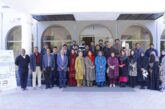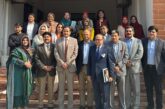
Media Tracker lists the challenges and achievements of the journalists and media organisations worldwide. Here’s a list of journalism at risk stories in the recent month. We would like to thank international media protection organisation and news outlets for their content.
-
- Two Reuter’s journalists, Wa Lone, 31, and Kyaw Soe Oo, 28, were arrested in Yangon on December 13, 2017, by local security forces and have been held by the authorities for over a hundred days. The pair had been investigating the death of 10 Muslims in a village in Rakhine State, western Myanmar. Rakhine State is home to an ongoing conflict that has forced more than 700,000 ethnic Muslim Rohingya to flee to Bangladesh. The conflict is a sensitive issue in Myanmar, and reporting on it has been proven to be difficult for both local as well as international reporters.Wa Lone and Kyaw Soe were invited by the local police to dinner and then taken into custody. They are accused of “possessing illegally acquired secret information related to Rakhine State and security”, by the Myanmar State and charged and prosecuted under the, a British Colonial law now rarely used, Myanmar Official Secrets Act. However, witnesses have testified the documents in question were already in the public domain. If convicted, the journalists face up to 14 years in prison.
(IPI)
- March 26th witnessed the murder of two Indian Journalists—crushed to death on the road—in separate incidents. Both the Journalists were 35 years of age. International Media Watchdogs, world over, demand swift and transparent investigations.Sandeep Sharma, investigative journalist in Madhya Pradesh state, had recently published two investigations about sand mafia for a regional TV station, News World, alleging involvement of the police officials in the illegal sand-mining mafia operations in the state.After the broadcast of his sting investigation, Sandeep had sought police protection but to no avail. He was on his motorcycle when a truck suddenly swerved, crushing him fatally. He breathed his last in the local hospital.Naveen Nishchal, a journalist for the Dainik Bhaskar daily was killed after being deliberately hit by a car, driven by a former village head—with many criminal cases against him. The lethal crash also took the life of Vijay Singh, a friend of Naveen who was riding with him. Locals set the vehicle on fire after the incident.With these first two cases journalists’ killing this year, India was ranked among the most dangerous countries in the world for journalists with 11 journalists and media staff killed in the past two years, according international media watchdogs.
(IFEX)
- Zeeshan, a 29-year-old journalist with Urdu daily Nawa-i-Waqt and former chairperson of the Sambrial Press Club, was shot in, hometown, Begowala by Imran Cheema, chairperson of the Begowala Union Council (UC) who was allegedly enraged by Zeeshan’s line of questioning.According to Zeehan’s family, he went to see the UC chairman to inquire about the complaints from the local shopkeepers as to the new taxes imposed on the local retailers. Zeeshan died on the spot as Cheema opened fire on him and then fled the scene. The police have registered a First Information Report (FIR) and are investigating the incident.Butt is the second journalist killed in Pakistan in 2018 after Anjum Muneer Raja, who was shot dead on March 1. Four journalists were killed in 2017 in Pakistan.
(IFJ)
- Two Reuter’s journalists, Wa Lone, 31, and Kyaw Soe Oo, 28, were arrested in Yangon on December 13, 2017, by local security forces and have been held by the authorities for over a hundred days. The pair had been investigating the death of 10 Muslims in a village in Rakhine State, western Myanmar. Rakhine State is home to an ongoing conflict that has forced more than 700,000 ethnic Muslim Rohingya to flee to Bangladesh. The conflict is a sensitive issue in Myanmar, and reporting on it has been proven to be difficult for both local as well as international reporters.Wa Lone and Kyaw Soe were invited by the local police to dinner and then taken into custody. They are accused of “possessing illegally acquired secret information related to Rakhine State and security”, by the Myanmar State and charged and prosecuted under the, a British Colonial law now rarely used, Myanmar Official Secrets Act. However, witnesses have testified the documents in question were already in the public domain. If convicted, the journalists face up to 14 years in prison.




